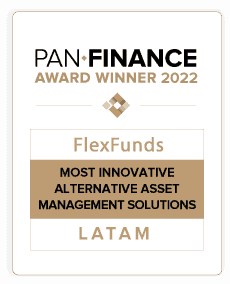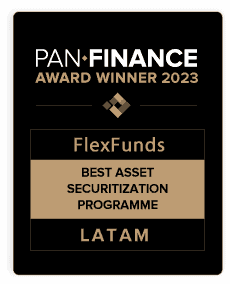In an increasingly globalized world, the map of investment opportunities has expanded thanks to digitization, which has contributed to closing existing gaps in access to financial products and has boosted the democratization of these options. These are some of the existing investment vehicles.
After a decade, since 2011, the global percentage of adults with access to a financial account has increased from 51% to 76%, according to the Global Findex report of the World Bank, which highlights that “digitalization facilitated this increase, as millions of adults opened accounts and started using them”.
As this proportion of users to the system increases, the interest in accessing investment vehicles also grows amidst a wide range of opportunities for generating income in the context of high-interest rates and an interesting panorama to generate returns.
FlexFunds, a leading company in the creation and launch of investment vehicles, managed to break the status quo by democratizing access to this type of financial instrument in a cost-efficient manner. Currently, asset managers, investment advisors, portfolio managers, hedge funds, stock exchange intermediaries, and family offices can, with FlexFunds, create investment vehicles similar to ETFs and facilitate capital raising on an international scale.
What are the investment vehicles?
Investment vehicles are divided into two large segments with different characteristics depending on the risk exposure and the profile each investor has, according to the horizon that is planted to fulfill its objectives.
On the one hand, there are fixed-income investments, which are usually structured for a more conservative investment profile to offer the payment of regular interests and the reimbursement of the invested capital once the agreed period is fulfilled. However, although they are linked to certain periods, they do not offer the liquidity of other instruments. Due to their profile, they are aimed at people with a long-term investment horizon.
In this type of instrument, Governments, and companies, among other entities, carry out debt issues to obtain financing leveraged from the capital that comes from the investors. Among its main characteristics is the fact that the rate of interest is agreed upon in advance.
On the other hand, variable income maybe part of investment funds, ETFs, or the purchase of shares in a company in exchange for compensation known in the market as dividends.
This type of instrument is more exposed to the volatility of the markets, and one of its main characteristics is that it does not offer a fixed flow of income, given that the performance of the different vehicles depends on the results pursued and the external conditions. There isn’t an established expiration date in its structure either.
Alternatives for each profile:
In the world of investment, there is an alternative for almost every type of investor, depending on your experience, the level of risk you want to assume, and the money you are willing to invest in a given investment vehicle.
Thanks to the global ‘boom’ of fintech, today it is possible to access fixed and variable income options at low amounts through virtual platforms that allow users to review the performance of their portfolios, almost like in real-time, make comparisons from graphs, see relevant news that affects the climate of the markets, among others. These are some of the most common finance investment vehicles:
For lower risk and moderate profiles:
In the context of high rates of global interest, fixed-income investment vehicles have acquired an important role in terms of the income they are providing, and that could extend during a good part of the year as the central banks try to fight against inflation.
In May 2023, the US Federal Reserve (Fed) increased the interest rate by 25 basis points, ranging from 5% to 5.25%, meaning that investors could continue to take advantage of this margin to obtain yields on this type of investment vehicle.
Among the most popular in the segment of fixed-income vehicles, the fixed-term deposit certificates or CDT stand out, whose term is set at a determined deadline, and once this is fulfilled, the agreed yield is granted.
On the other hand, for investors with a low to moderate risk profile, government bonds are also available, which are issued to finance countries where the risk of default is considered low. Some examples include US Treasury bonds (Treasuries), German government bonds (Bunds), or Japanese bonds (JGBs).
Debt issuance can also come from corporations with funding requirements to advance their projects. The credit strength of the issuing company is decisive in these cases to establish probable yields and possibly assess the level of risk.
For the highest risk profiles:
Among the most common alternatives within variable income investments are equity shares, which allow exposure to the stock market and participation in corporate earnings through the acquisition of securities that yield according to the performance of companies on the stock exchange.
Investment funds are included within the options range, managed by professional managers who seek to maximize the funds deposited by investors through different strategies in a diversified portfolio of assets.
Other types of investments for higher risk profiles include ETFs or investment funds traded on the exchange, whose strategy is focused on punctually replicating the performance of a reference index such as the S&P500, offering exposure in different sectors while contributing to portfolio diversification.
On the list of the most popular investment vehicles also appear REITs or investment trusts in real estate, which allow investors to participate in this sector without directly acquiring property and obtaining income from these assets. An example would be through rent obtained commercial or residential real estate.
Ultimately, knowing the terms of investment vehicles and understanding their risk profile is key to making the right financial decisions in line with the goals set by investors. Its level of income, the stage of development, the time it requires to receive returns, the degree of exposure you want, and the knowledge you have of the instrument, among other factors, are decisive to select an alternative.
At FlexFunds, we recommend evaluating the different investment alternatives that best adapt to your financial objectives, accompanied by a team of advisors who will guide you along the way. FlexFunds has more than one decade of experience structuring listed investment vehicles similar to ETFs. Do not hesitate to contact us to evaluate the option that best suits your profile.
Source:
https://www.worldbank.org/en/news/feature/2023/02/02/latest-global-findex-data-chart-10-years-of-progress-in-financial-inclusion







